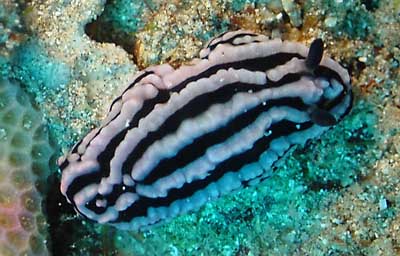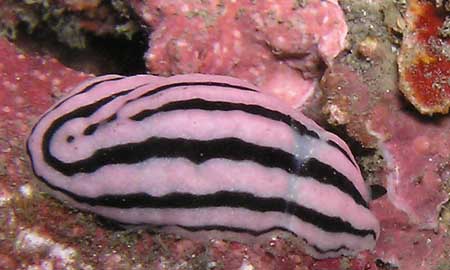This species has been observed on Reunion, Mayotte, Mauritius, Madagascar and Seychelles Islands
Remarks :
![]() There is in our region a group of nudibranchs that I will call Phyllidiella meandrina/rosans/zeylanica difficult to identify, for two reasons: on the one hand the existence of many intermediate forms and on the other hand the very marked differences of opinion between specialists about these species ... I finally decided to make a classification (very questionable) of these specimens
There is in our region a group of nudibranchs that I will call Phyllidiella meandrina/rosans/zeylanica difficult to identify, for two reasons: on the one hand the existence of many intermediate forms and on the other hand the very marked differences of opinion between specialists about these species ... I finally decided to make a classification (very questionable) of these specimens
- Group Phyllidiella rosans : There are 6-9 rounded, longitudinal pink ridges which are relatively smooth
- Group Phyllidiella cf. rosans : Up to nine rounded, longitudinal pink ridges which are relatively smooth with with surnumerous pink tubercules
- Group Phyllidiella meandrina : In the central part of the mantle there a characteristic pattern of pink to grey-blue rings
- Group Phyllidiella cf. meandrina : The disposition of the tubercles looks like P. meandrina but there are transverse black area beetween the tubercles all over the notum
- Group Phyllidiella zeylanica : In adult, up to nine longitudinal pink ridges (broken or interrupted) may occur and medially, presence of a more or less developed network of black band around the tubercles
Bibliographic data : Material examined by David J.Brunckhorst ( see references/publications).
Other external morphology characteristics
|
 |
Similar species
Phyllidiella rosans is rather similar in colour and pattern to Phyllidiella zeylanica.
Live specimens ranged in length from 18-35 mm .
There are 6-9 longitudinal pink to grey-blue ridges.
The tubercules are rounded, which send a relatively smooth aspect to the pink to grey-blue ridge.
Only longitudinal black lines.
The rhinophores are black with the black pale pink and each rhinophoral clavus possesses 12 to 15 black lamellae (specimens greater than 30mm).
The gills and oral tentacles are pale grey.
The pale grey foot sole has numerous tiny, dark grey spots.
Live specimens ranged in length from 5-60 mm
Up to nine longitudinal pink to grey-blue ridges.
The ridges are formed from the coalesced bases of compound tubercles which send a very tuberculate, uneven and irregular aspect to the pink to grey-blue ridge.
Sometimes there is some cross-bars of black lines.
The rhinophores are black and each rhinophoral clavus possesses 20 to 23 lamellae (specimens greater than 30mm).
The gills and oral tentacles are dark grey.
The foot sole is white.
(Brunckhorst considered "smooth" non-tuberculate ridges characterised this species but from the various photos on the Bill Rudman Forum, it would seem some small tubercles, are part of the variability.)
References :
Bill Rudman Seaslug site : Sea Slug Forum : Phyllidiella rosans
Publications :
Brunckhorst, D.J. (1993) The systematics and phylogeny of Phyllidiid Nudibranchs (Doridoidea). Records of the Australian Museum, Supplement 16 : 1-107.
Other photos of Phyllidiella rosans :
Matthias Deuss Mayotte, 31 December 2008
|
 |
 |
Philibert Bidgrain Mayotte, M'tsanga Guini, less 1 m, 27 July 2008, size : 20-25 mm |
Matthias Deuss Mayotte, Passe en S, 20 m, 18 July 2009, size : 25 mm
|
 |
 |
Jean Roger Mayotte, Passe en S, 19 November 2017 Crawling on Thelenota ananas... |
|
|
Hugues Flodrops Reunion, 26 November 2016.
Mating behavior... |
Alain-Benoît Rasssat Madagascar, Nosy bé
|
 |
|
|
Florence Trentin Reunion, "Les kiosques" at Saint Leu, 18 m, Photo of the pale grey foot sole of the specimen present in the upper photo, |
Maurice Jay Reunion, "Cap La Houssaye" at Saint Paul, 10 m.
|
 |
 |
Maurice Jay Reunion, 1989, dorsal view of 35 mm specimen. Published in Brunckhorst D.J. 1993 The systematics and phylogeny of Phyllidiid Nudibranchs : Plate 6D. |
Marina Poddubetskaia Reunion, "Le platier de la Pointe au Sel", Saint Leu, 24m, 07 October 2002, size : 25-30 mm |
 |
 |
Florence trentin Reunion, "Cap la Houssaye" at Saint Paul, 10 m , |
Florence Trentin Reunion, Saint Leu , 15-20 m 15 May 2004. May be a juvenile ...
|
 |
In Nudibranches of Seychelles by Christophe Mason-Parker Observed at Baie Ternay, Mahé, size : 30 mm
|
Available online on Archipelago Island
|
More photos from Indian Ocean
Mauritius, Phyllidiella rosans, at Peyrebere, by Marina Poddubetskaia
Mauritius, two Phyllidiella rosans, at Pereybere, by Marina Poddubetskaia


